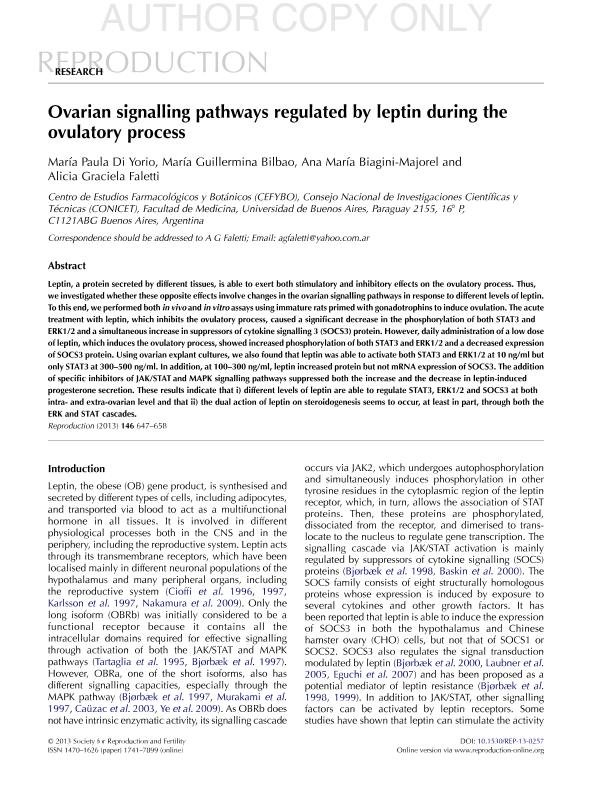Mostrar el registro sencillo del ítem
dc.contributor.author
Di Yorio, María Paula

dc.contributor.author
Bilbao, María Guillermina

dc.contributor.author
Biagini Majorel, Ana María
dc.contributor.author
Faletti, Alicia Graciela

dc.date.available
2016-11-30T17:25:21Z
dc.date.issued
2013-10
dc.identifier.citation
Di Yorio, María Paula; Bilbao, María Guillermina; Biagini Majorel, Ana María; Faletti, Alicia Graciela; Ovarian signaling pathways regulated by leptin during the ovulatory process; Bioscientifica; Reproduction; 146; 6; 10-2013; 647-658
dc.identifier.issn
1470-1626
dc.identifier.uri
http://hdl.handle.net/11336/8510
dc.description.abstract
Leptin, a protein secreted by different tissues, is able to exert both stimulatory and inhibitory effects on the ovulatory process. Thus, we investigated whether these opposite effects involve changes in the ovarian signalling pathways in response to different levels of leptin. To this end, we performed both in vivo and in vitro assays using immature rats primed with gonadotrophins to induce ovulation. The acute treatment with leptin, which inhibits the ovulatory process, caused a significant decrease in the phosphorylation of both STAT3 and ERK1/2 and a simultaneous increase in suppressors of cytokine signalling 3 (SOCS3) protein. However, daily administration of a low dose of leptin, which induces the ovulatory process, showed increased phosphorylation of both STAT3 and ERK1/2 and a decreased expression of SOCS3 protein. Using ovarian explant cultures, we also found that leptin was able to activate both STAT3 and ERK1/2 at 10 ng/ml but only STAT3 at 300–500 ng/ml. In addition, at 100–300 ng/ml, leptin increased protein but not mRNA expression of SOCS3. The addition of specific inhibitors of JAK/STAT and MAPK signalling pathways suppressed both the increase and the decrease in leptin-induced progesterone secretion. These results indicate that i) different levels of leptin are able to regulate STAT3, ERK1/2 and SOCS3 at both intra- and extra-ovarian level and that ii) the dual action of leptin on steroidogenesis seems to occur, at least in part, through both the ERK and STAT cascades.
dc.format
application/pdf
dc.language.iso
eng
dc.publisher
Bioscientifica

dc.rights
info:eu-repo/semantics/openAccess
dc.rights.uri
https://creativecommons.org/licenses/by-nc-sa/2.5/ar/
dc.subject
Leptin
dc.subject
Signaling
dc.subject
Ovary
dc.subject
Ovulation
dc.subject.classification
Fisiología

dc.subject.classification
Medicina Básica

dc.subject.classification
CIENCIAS MÉDICAS Y DE LA SALUD

dc.title
Ovarian signaling pathways regulated by leptin during the ovulatory process
dc.type
info:eu-repo/semantics/article
dc.type
info:ar-repo/semantics/artículo
dc.type
info:eu-repo/semantics/publishedVersion
dc.date.updated
2016-11-24T17:21:09Z
dc.journal.volume
146
dc.journal.number
6
dc.journal.pagination
647-658
dc.journal.pais
Reino Unido

dc.journal.ciudad
Bristol
dc.description.fil
Fil: Di Yorio, María Paula. Consejo Nacional de Investigaciones Científicas y Técnicas. Oficina de Coordinación Administrativa Houssay. Centro de Estudios Farmacológicos y Botánicos; Argentina
dc.description.fil
Fil: Bilbao, María Guillermina. Consejo Nacional de Investigaciones Científicas y Técnicas. Oficina de Coordinación Administrativa Houssay. Centro de Estudios Farmacológicos y Botánicos; Argentina
dc.description.fil
Fil: Biagini Majorel, Ana María. Consejo Nacional de Investigaciones Científicas y Técnicas. Oficina de Coordinación Administrativa Houssay. Centro de Estudios Farmacológicos y Botánicos; Argentina
dc.description.fil
Fil: Faletti, Alicia Graciela. Consejo Nacional de Investigaciones Científicas y Técnicas. Oficina de Coordinación Administrativa Houssay. Centro de Estudios Farmacológicos y Botánicos; Argentina
dc.journal.title
Reproduction

dc.relation.alternativeid
info:eu-repo/semantics/altIdentifier/url/http://www.reproduction-online.org/content/146/6/647.long
dc.relation.alternativeid
info:eu-repo/semantics/altIdentifier/doi/http://dx.doi.org/10.1530/REP-13-0257
Archivos asociados
